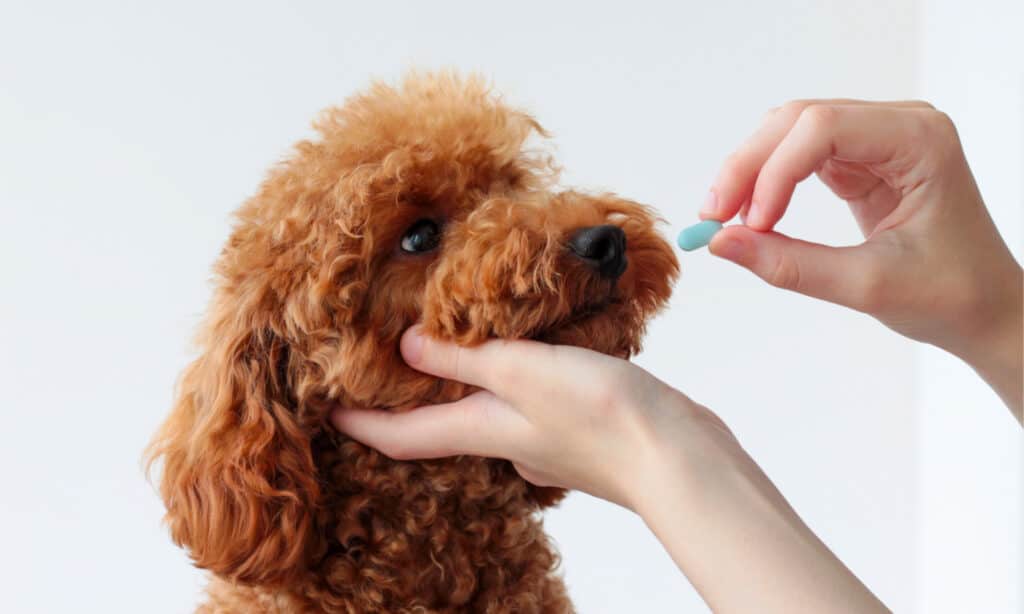Has your dog just been prescribed a medication called doxycycline? If so, you likely have quite a few questions in mind!
So what is doxycycline, what does it do, and are there any medication side effects you need to be aware of? Let’s answer all your questions below!
What Is Doxycycline?

Doxycycline is an antibiotic that is used to fight infections in humans and animals.
©Varvara Serebrova/Shutterstock.com
Doxycycline is a tetracycline antibiotic that is commonly used in both human and animal medicine. Doxycycline is designed to block the growth of certain types of bacteria, and even decrease inflammation associated with certain medical conditions.
Doxycycline is commonly used in human medicine, but most vet offices carry a form of doxycycline that was designed with dogs and cats in mind. These forms have concentrations that are more suitable for pets, and some can even be compounded with animal-friendly flavoring.
Is Doxycycline Safe For Use In Dogs?
Doxycycline is safe for use in dogs when following the guidance of your veterinarian. Doxycycline comes with very specific instructions and doses based on the condition your pup is experiencing, so it should only be used when prescribed by a veterinarian. Doxycycline is also used to target specific types of bacteria and inflammatory conditions, so it is only useful when tackling certain ailments.
Why Do Dogs Take Doxycycline?
Doxycycline is used to tackle an array of medical conditions in dogs, so let’s list a few of its most common uses below. Doxycycline is often prescribed to dogs for the following issues:
- Tick, flea, and mosquito borne illnesses
- Dental infections
- Respiratory infections
- Severe wound infections
- Severe skin infections
- Leptospirosis
- Urinary infections
- As a precaution if your dog is immune compromised for any reason
- Other complicated infections
Doxycycline will often be used alongside other antibiotics for severe bacterial infections, so your vet may prescribe it with other medications in some situations.
Just be sure to let your vet know if your dog is currently taking other medications, as there is always a risk of dangerous drug interactions. We discuss drug interactions in detail below.
How Is Doxycycline Given In Dogs?

Doxycycline should always be given with a meal, as it can lead to vomiting and abdominal pain when given on an empty stomach.
©JOKE_PHATRAPONG/Shutterstock.com
Doxycycline can be found in pill or liquid form, and should be given by mouth as directed by your veterinarian. Most vets will prescribe a doxycycline dose to be given once a daily, as it is a strong antibiotic that can be a bit harsh on the stomach.
Due to how harsh doxycycline can be on the stomach, it must always be given directly after your dog has eaten a meal. It is known to cause vomiting, acid reflux, and abdominal pain when given on an empty stomach. Giving it before a meal may not be enough to protect your dog’s stomach, so it is best to give it directly after your pup has eaten.
Are There Side Effects Of Doxycycline For Dogs?
Doxycycline is safe for dogs when following the guidance of your veterinarian, but there are a few side effects that are commonly seen with the antibiotic. These potential side effects include:
- Lethargy
- Vomiting
- Diarrhea
- Flatulence
- Decreased appetite
- Abdominal discomfort
We suggest reaching out to your vet for guidance if your little one is experiencing the above side effects. They may be able to offer guidance on how to alleviate their side effects, or they may suggest altering their dose.
It’s also important to note that side effects are most common in dogs that are not given the medication on a full stomach, so you may simply need to adjust the timing in which you are offering the antibiotic. This is especially true if your little one is vomiting soon after taking their doxycycline.
What Is The Doxycycline Dose For Dogs?
Before we discuss common doses of doxycycline in dogs, we should mention again that you should never give your dog doxycycline without veterinary approval.
Doxycycline doses in dogs will vary from case to case, but the average dose is 5-10 mg/kg once daily. Though the daily dose appears to be similar for pups across the board, the length of time it is offered varies greatly.
For example, some tick-borne illnesses will require an 8 week period of daily doxycycline, and sometimes even longer if your pup is still positive for tick disease. This is why it is so important to follow your vet’s guidance, as you always want to treat your pup’s illness accordingly.
Doxycycline Risks To Be Aware Of In Dogs
As we mentioned above, the most common risk associated with doxycycline use in dogs is GI upset. Doxycycline can be harsh on the digestive system, which is why it is so important to only give it on a full stomach. Giving doxycycline with food will significantly decrease the risk of GI upset in dogs, but it can still occur in some sensitive pups.
Another risk to be aware of with doxycycline use in dogs is the potential for drug interactions. Some dogs will experience adverse reactions when giving doxycycline alongside other medications, so it’s essential to let your vet know if your dog is currently taking other medications or supplements if they are prescribed doxycycline.
You should not give your dog doxycycline if they are currently taking the following medications:
- Anti-seizure medications
- Antacids
- Iron supplements
- Anticoagulants
- Antibiotics of a similar class
Your vet may be able to offer guidance on how to give doxycycline alongside the above medications safely, so always speak with your vet about any medications your dog is currently taking.
It is also important to let your vet know if your dog could be pregnant, as doxycycline had been tied to birth defects when given to pregnant mothers. Your vet can weigh the risks associated with the necessity of the antibiotic, and they can make the best decision for your little one’s overall health.
Can My Puppy Take Doxycycline?
Puppies can take doxycycline if they are under the care of a veterinarian. Your veterinarian will offer a dose and frequency that is safe for growing pups, and they can monitor your little one for any complications along the way. Never give your puppy doxycycline without veterinary approval.
Can Dogs Be Allergic To Doxycycline?
Allergic reactions to doxycycline are rare in dogs, but they are not impossible. Allergic reactions to new medications typically develop within 12-24 hours of first taking the medication, so it’s important to monitor your dog closely during this period.
Some of the common symptoms of an allergic reaction in dogs include:
- Skin redness
- Hives
- Itchy skin
- Lethargy
- Vomiting
- Diarrhea
- Changes in breathing
Always reach out to your vet if you notice any of the above symptoms in your dog after taking doxycycline.
Can My Dog Overdose On Doxycycline?
It is possible for dogs to overdose on doxycycline if they are accidently given too high of a dose, or if they somehow get their paws on their bottle of doxycycline. We suggest reaching out to your vet ASAP if you think your dog has consumed more than their recommended dose of doxycycline.
The most common sign of doxycycline overdose is severe GI upset, and it often requires veterinary care to resolve. Always seek veterinary care if you suspect an overdose in your pup, as this offers them the best chance at a swift recovery.
Final Thoughts
Doxycycline is a human medication that can also be prescribed for use in dogs. Be sure to review the information we discussed above on safe administration of doxycycline in dogs, and you will better understand how this medication can help your canine companion!
The photo featured at the top of this post is © Donna Ellen Coleman/Shutterstock.com
Ready to discover the top 10 cutest dog breeds in the entire world?
How about the fastest dogs, the largest dogs and those that are -- quite frankly -- just the kindest dogs on the planet? Each day, AZ Animals sends out lists just like this to our thousands of email subscribers. And the best part? It's FREE. Join today by entering your email below.
Thank you for reading! Have some feedback for us? Contact the AZ Animals editorial team.






